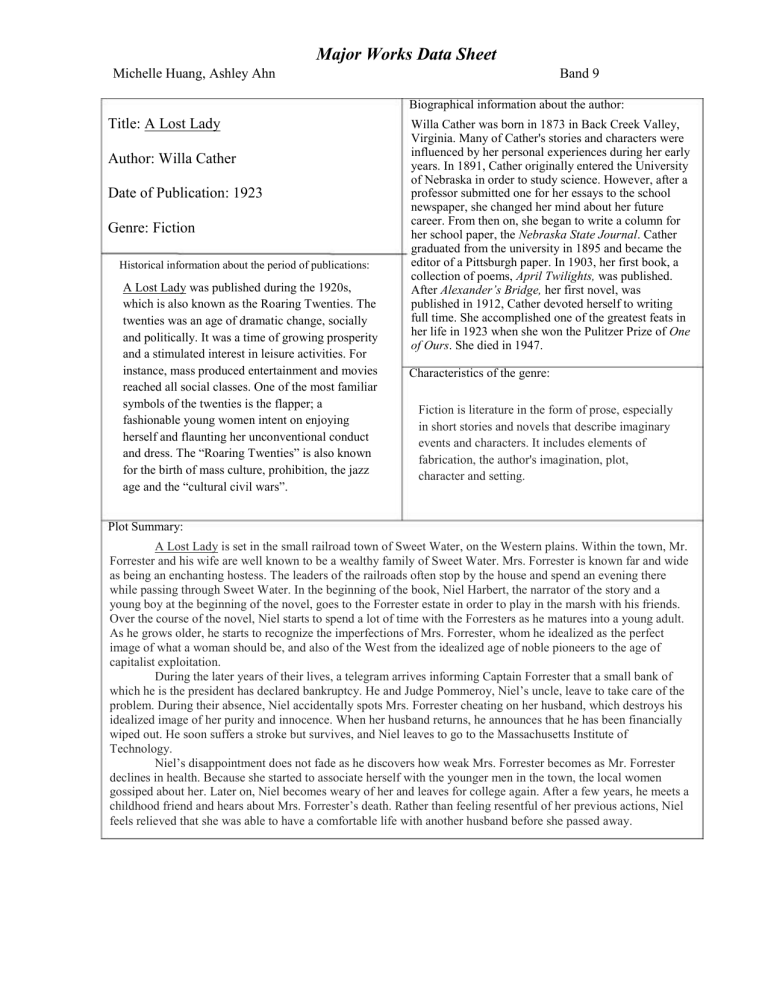A Lost Lady B9

Michelle Huang, Ashley Ahn
Major Works Data Sheet
Band 9
Title: A Lost Lady
Author: Willa Cather
Date of Publication: 1923
Genre: Fiction
Biographical information about the author:
Willa Cather was born in 1873 in Back Creek Valley,
Virginia. Many of Cather's stories and characters were influenced by her personal experiences during her early years. In 1891, Cather originally entered the University of Nebraska in order to study science. However, after a professor submitted one for her essays to the school newspaper, she changed her mind about her future career. From then on, she began to write a column for her school paper, the Nebraska State Journal . Cather graduated from the university in 1895 and became the
Historical information about the period of publications:
A Lost Lady was published during the 1920s, editor of a Pittsburgh paper. In 1903, her first book, a collection of poems, April Twilights, was published.
After Alexander’s Bridge, her first novel, was which is also known as the Roaring Twenties. The twenties was an age of dramatic change, socially published in 1912, Cather devoted herself to writing full time. She accomplished one of the greatest feats in and politically. It was a time of growing prosperity her life in 1923 when she won the Pulitzer Prize of One of Ours . She died in 1947.
and a stimulated interest in leisure activities. For instance, mass produced entertainment and movies
Characteristics of the genre: reached all social classes. One of the most familiar symbols of the twenties is the flapper; a fashionable young women intent on enjoying herself and flaunting her unconventional conduct and dress. The “Roaring Twenties” is also known for the birth of mass culture, prohibition, the jazz
Fiction is literature in the form of prose, especially in short stories and novels that describe imaginary events and characters. It includes elements of fabrication, the author's imagination, plot, character and setting. age and the “cultural civil wars”.
Plot Summary:
A Lost Lady is set in the small railroad town of Sweet Water, on the Western plains. Within the town, Mr.
Forrester and his wife are well known to be a wealthy family of Sweet Water. Mrs. Forrester is known far and wide as being an enchanting hostess. The leaders of the railroads often stop by the house and spend an evening there while passing through Sweet Water. In the beginning of the book, Niel Harbert, the narrator of the story and a young boy at the beginning of the novel, goes to the Forrester estate in order to play in the marsh with his friends.
Over the course of the novel, Niel starts to spend a lot of time with the Forresters as he matures into a young adult.
As he grows older, he starts to recognize the imperfections of Mrs. Forrester, whom he idealized as the perfect image of what a woman should be, and also of the West from the idealized age of noble pioneers to the age of capitalist exploitation.
During the later years of their lives, a telegram arrives informing Captain Forrester that a small bank of which he is the president has declared bankruptcy. He and Judge Pommeroy, Niel’s uncle, leave to take care of the problem. During their absence, Niel accidentally spots Mrs. Forrester cheating on her husband, which destroys his idealized image of her purity and innocence. When her husband returns, he announces that he has been financially wiped out. He soon suffers a stroke but survives, and Niel leaves to go to the Massachusetts Institute of
Technology.
Niel’s disappointment does not fade as he discovers how weak Mrs. Forrester becomes as Mr. Forrester declines in health. Because she started to associate herself with the younger men in the town, the local women gossiped about her. Later on, Niel becomes weary of her and leaves for college again. After a few years, he meets a childhood friend and hears about Mrs. Forrester’s death. Rather than feeling resentful of her previous actions, Niel feels relieved that she was able to have a comfortable life with another husband before she passed away.
Major Works Data Sheet
Describe the author’s style:
An example that demonstrates the style:
Page 2
Willa Cather uses the element of modernism in her novel. "Long, long afterward, when Niel did not know whether Mrs.
There is a sense of fragmentation in plot, characters, theme, Forrester were living or dead, if her image flashed into his mind, images, and overall story line. Thus, for instance, many it came with a brightness of dark eyes, ... When he was dull and tired of everything, he used to think that if he could hear that modernist works are not in the typical linear sequence.
Loss is a huge theme in modernist works. The “truth” is long-lost lady laugh again, he could be gay." (page59) questionable, as a common theme, and thus, you cannot This quotation not only shows an example of fragmentation because it is separate from the rest of the chapter which focuses always trust the narrator to tell the truth, whereas in traditional literature it is the narrator’s job to make the reader understand what’s going on. In addition, the tone of the book is nostalgic. She also incorporates an ambiguous on the past events, but it also shows the author's use of modernism because it is not written in the typical linear sequence. ending which leaves a lot of questions to be considered by the reader.
In addition...
The ending is ambiguous because Niel hears about what happens to Mrs. Forrester in the last years of her life from someone else
The narration is very biased as it is seen through Niel’s point of view
Quotation
Memorable Quotes
Significance
"There were two distinct social strata in the prairie States; the homesteaders and hand-workers who were there to make a
This quotation shows how things used to be in the "Old Western" era, which is greatly reflected in the term "rags to riches" in which the diligent workers labored in order to achieve the "American dream". Both the laborers and the living, and the bankers and the gentlemen businessmen worked together in order to develop the West into a place of ranchers who came from the Atlantic prosperity. seaboard to invest money and to "develop our great West," as they used to tell us."
"The Old West had been settled by dreamers, great-hearted adventurers who were unpractical to the point of magnificence: a courteous brotherhood,
This quotation is significant because it shows the demoralization of what the
West used to be. Instead of the hard working workers, men like Ivy Peters manipulated the businesses, even though they do not actually do anything for the greater good of their community. The image of the “Old West” remains strong in attack but weak in defense, who an idealistic remnant for the workers who initially went in order to succeed. could conquer but could not hold. Now all the vast territory they had won was to be at the mercy of men like Ivy Peters, who had never dared anything, never risked anything."
“Lilies that fester smell far worse than weeds.”
This quotation shows Niel’s disgust at Marian because of the idealistic image that he has for her. Marian is like a lily to Niel and he has much higher expectations for a flower that is supposed to smell fragrant than for common weeds. Marian’s affair contradicts the fragrant lilies and the perfect image that Niel has of her.
Major Works Data Sheet
Name Role in the story
Captain Forrester One of the original pioneers who settled in Sweet Water and was a railroad contractor
Marian Forrester Captain Forrester’s wife
Niel Herbert A boy who grew up admiring the
Forresters
Ivy Peters
Frank Ellinger
Adolph Blum
An older boy who is poor and hateful towards the Forresters.
He later becomes a lawyer and takes over the Forrester house
Has an affair with
Mrs. Forrester
One of Niel’s friends.
He is a poor boy who illegally sells game to
Mrs. Forrester and the first one to know about Marian and
Frank Ellinger’s affair
Page 3
Characters
Significance Adjectives
He is part of the Old West and his deteriorating health - considerate represents how the Old West is - dependable dying away - honorable
- traditional
She is a relic of the Old World - lively that becomes lost in the New
World; she represents the effects of the time change on
- charming
- attractive
- dependent high class society - reckless
The changing times is witnessed from his point of view and he is stuck in his ideals of the Old World
- idealistic
- loyal
- protective
He represents the New World and the greedy settlers who exploit the dreams of the pioneers
- pretentious
- cruel
- abhorrent
- greedy
His affair with Marian ruins
Niel’s idealistic image of her
He keeps Marian’s affair a - submissive secret, which shows his respect - loyal for her and submission to class - feudal distinctions; he does not enter the house at Captain
Forrester’s funeral
- bachelor
- opportunistic
- promiscuous
Major Works Data Sheet
Setting
The setting is in the town of Sweet Water during a time span between the pioneer era
(late 19 th
(early 20
Century) and the capitalist era th
Century). Sweet Water is right next to the Burlington railroad and the
Forrester house is the first and the last thing one sees upon arriving in or departing from Sweet Water.
Page 4
Significance of opening scene
The opening scene begins with a description of the
Forrester house thirty or forty years ago, which represents the Old West that was settled by homesteaders and gentlemen ranchers. There was a meadow that was half pasture land, half marsh and
Captain Forrester left it that way instead of turning it into productive fields because he thought it looked beautiful; no one was allowed to hunt in the meadow.
The Forrester house represents a time when the
Forresters were well respected before the new wave of settlers took over and destroyed the dreams of the pioneers with their greed. Mrs.Forrester always stood on the porch to welcome important visitors who came to admire their house and she had the authority to keep
Ivy Peters and the other boys from entering the parlor, which establishes the class distinctions.
Significance of the ending/closing scene
Symbols
Woodpecker – Ivy slits the woodpecker’s eyes and it starts flying aimlessly while Niel tries to save it; this foreshadows how Ivy harms Marian and how Niel tries to prevent her from being corrupted by Ivy.
Sundial – The sundial is a symbol of an earlier time before the West was developed and the decline of the pioneer era. It is placed on the Captain’s grave to represent how the ideals of the Old West have died along with the Captain.
Marsh – The draining of the marsh represents how the ideals are changing for the New West; money and profit are more important than aesthetic pleasure.
The ending scene shows how the Forresters and other homesteaders lost their status and power; all the pioneers have left the West and Captain Forrester is dead. Marian has no more money and has to rent out the meadow to Ivy Peters, who drains the marsh to grow crops and hunts on the land. Ivy is allowed to enter the house as he pleases and even put his arms around her. He gains power over Marian and later moves into the Forrester house, which shows how the new settlers have taken over everything that was part of the Old West. Niel is disappointed in the way Marian refuses to die with the times but instead moves out of
Sweet Water to marry an Englishman. She is a “lost lady” because she is lost between the Old West and the
New West with her refusal to accept her decline in society.
Possible Themes—Topics of Discussion
Shift from old world to new world
- Should people accept change or hold on to their traditions?
- Does change lead to progress?
Loss of values/ethics of change
- Does idealization of the past hinder progress?
- Does change always come with power and corruption?








